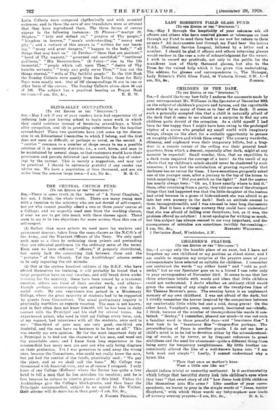THE CENTRAL CHURCH FUND.
(To THE EDITOR Or THE " SPECIETOR.")
SIR,—There is some truth in the letter of "A Naval Chaplain," but not, I think, the- whole. truth. There are many young men with a vocation to the ministry who are not devoid of self-respect, but yet who cannot possibly afford a two or three years' course at a College; and we urgently, need nien from the working- classes, if ever we are to get into touch with these elesses• again. There' seem to me to be two objections far more serious than this one of self-respect.
(1) Rather than more priests we need more lay workers and permanent deacons, taken from the same classes as the N.C.O.'s of the Army, and the Warrant Officers of the Navy. We only spoil such men as a class by ordaining them priests and pretending' they are educated gentlemen (in the ordinary sense of the term). Even now we have sufficient "officers," if properly distributed, but sorely lack the connecting link between them and the "
privates" of the Church. Yet -the. Archbishops' scheme- seems to be only repeating the old mistake.
(2) Out of the sixteen hundred soldiers of the B.E.F. who have offered themselves for training, it will probably be found that a large proportion have no real vocation, and will break down under tlaiiiing for the ministry. Some have been roused by a transient emotion, others are tired of their secular work, and others— though perhaps unconsciously—are actuated by a rise in the social scale. My own experience was gained in a Missionary College, where the great majnrity of students had to be-supported by grants from Committees. The usual preliminary inquiry is- practically worthless as regards vocation The man is not known, and in fact often does not know himself, till he has been in daily contact with the Principal and his staff for several terms. An experienced priest, who used to visit my College every term, and, at my request, had interviews with all the students,, once said to me : "One-third of your Ma are very good, one-third are doubtful, and. the rest have no business to be here at all." This. was exactly my own opinion. By far the most important duty of a Principal is to find out thescharaeter of his men, and weed out the unsuitable ones; and I know from long experience in the mission-field how many men axe sent out who only bring disgrace on their profession. Yet I was powerless to send away the wrong ones, because the Committees,. who could not really know the men, but yet had the control of the- funds, practically said:, "We pay the piper, and so we shall call the tune." My College was threatened with financial ruin, and so of course I resigned. I only know of one College (Kelham) where the Rector has quite a free hand to tall a Man that he has mistaken his vocation; and he is free because he refuses to receive grants of this kind. Unless the Archbishops give the Colleges block-grants, and then leave the Principals untrammelled, subject to an appeal to the Visitor, their scheme will do more-halm than good.—I am, Sir, fm.,
A FORMER PRINCIPAL.


























 Previous page
Previous page